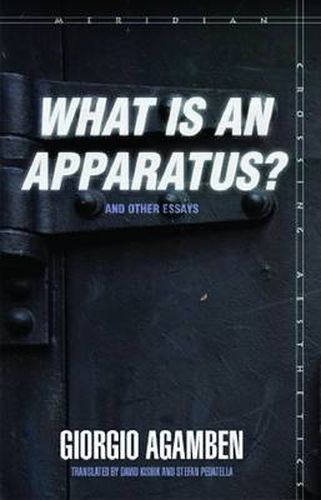Readings Newsletter
Become a Readings Member to make your shopping experience even easier.
Sign in or sign up for free!
You’re not far away from qualifying for FREE standard shipping within Australia
You’ve qualified for FREE standard shipping within Australia
The cart is loading…






The three essays collected in this book offer a succinct introduction to Agamben’s recent work through an investigation of Foucault’s notion of the apparatus, a meditation on the intimate link of philosophy to friendship, and a reflection on contemporariness, or the singular relation one may have to one’s own time.
Apparatus (dispositif in French) is at once a most ubiquitous and nebulous concept in Foucault’s later thought. In a text bearing the same name ( What is a dispositif? ) Deleuze managed to contribute its mystification, but Agamben’s leading essay illuminates the notion: I will call an apparatus, he writes, literally anything that has in some way the capacity to capture, orient, determine, intercept, model, control, or secure the gestures, behaviors, opinions, or discourses of living beings. Seen from this perspective, Agamben’s work, like Foucault’s, may be described as the identification and investigation of apparatuses, together with incessant attempts to find new ways to dismantle them.
Though philosophy contains the notion of philos, or friend, in its very name, philosophers tend to be very skeptical about friendship. In his second essay, Agamben tries to dispel this skepticism by showing that at the heart of friendship and philosophy, but also at the core of politics, lies the same experience: the shared sensation of being.
Guided by the question, What does it mean to be contemporary? Agamben begins the third essay with a reading of Nietzsche’s philosophy and Mandelstam’s poetry, proceeding from these to an exploration of such diverse fields as fashion, neurophysiology, messianism and astrophysics.
$9.00 standard shipping within Australia
FREE standard shipping within Australia for orders over $100.00
Express & International shipping calculated at checkout
The three essays collected in this book offer a succinct introduction to Agamben’s recent work through an investigation of Foucault’s notion of the apparatus, a meditation on the intimate link of philosophy to friendship, and a reflection on contemporariness, or the singular relation one may have to one’s own time.
Apparatus (dispositif in French) is at once a most ubiquitous and nebulous concept in Foucault’s later thought. In a text bearing the same name ( What is a dispositif? ) Deleuze managed to contribute its mystification, but Agamben’s leading essay illuminates the notion: I will call an apparatus, he writes, literally anything that has in some way the capacity to capture, orient, determine, intercept, model, control, or secure the gestures, behaviors, opinions, or discourses of living beings. Seen from this perspective, Agamben’s work, like Foucault’s, may be described as the identification and investigation of apparatuses, together with incessant attempts to find new ways to dismantle them.
Though philosophy contains the notion of philos, or friend, in its very name, philosophers tend to be very skeptical about friendship. In his second essay, Agamben tries to dispel this skepticism by showing that at the heart of friendship and philosophy, but also at the core of politics, lies the same experience: the shared sensation of being.
Guided by the question, What does it mean to be contemporary? Agamben begins the third essay with a reading of Nietzsche’s philosophy and Mandelstam’s poetry, proceeding from these to an exploration of such diverse fields as fashion, neurophysiology, messianism and astrophysics.